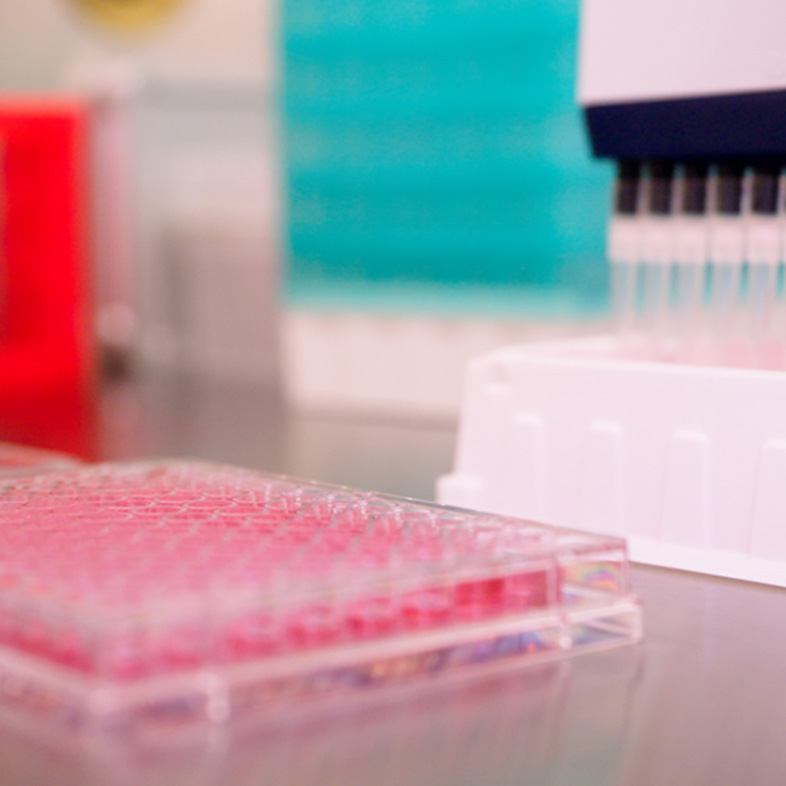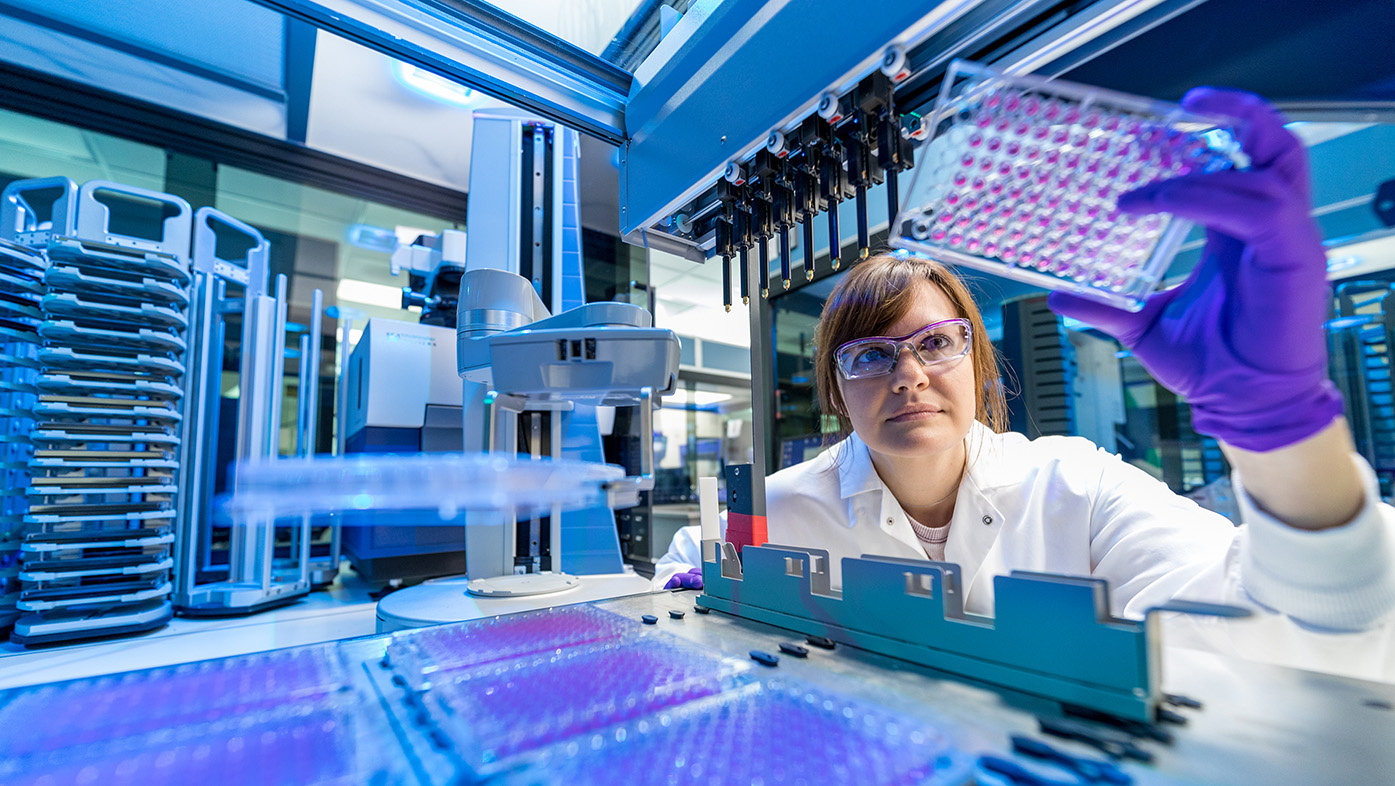The age of precision cancer therapeutics: Advancing the anti-cancer modality toolbox
Scientists have been able to answer many important questions regarding the nuances of cancer resulting in life-changing therapies for some diseases. However, there is a continued need to solve the challenges that remain for millions of patients with hard-to-treat cancers or drug resistance. To advance from here, scientists must have a strong understanding of causal human biology and access to and expertise with a broad array of modalities from which to choose in order to optimally modulate therapeutic targets. Critical components of the modality toolbox include precision-based approaches—such as antibody-drug conjugates (ADCs) and radiopharmaceutical therapies (RPTs). These modalities have already shown practice-changing results and are poised to deliver innovation in the future of cancer therapy.
- Precision targeting in cancer therapy is critical to distinguish between cancer cells and healthy cells.
- Bristol Myers Squibb has extensive expertise in cell surface antigen biology and is both building on foundational targets and uncovering new targets as we advance antibody-drug conjugates (ADCs) and radiopharmaceutical therapies (RPTs).
- ADCs are a rapidly developing modality and progress has been propelled forward in recent years by advancements in selectivity, linker technology and therapeutic payloads. We are pursuing next-generation cytotoxic payloads and investigating novel payloads.
The promise of precision-based cancer treatment
Precision therapies are increasingly important to distinguish between cancer cells and healthy cells. Successful targeting of cancer cells while sparing healthy cells is one of the primary goals of cancer researchers, driving efficacy while limiting toxicity. This approach is dependent on the reliable identification of targets with certain properties, such as the cell types on which it’s present, location within the cell and expression levels. Bristol Myers Squibb has extensive expertise in cell surface antigen biology and is both building on foundational targets and uncovering new targets as we advance multiple types of precision-based modalities within our pipeline, including ADCs and RPTs.
While ADCs and RPTs are different modalities, they do have some characteristics in common: delivered via precise antigen targeting, ADCs and RPTs both carry a payload directly to tumor cells.
- ADCs consist of 3 elements: the monoclonal antibody that preferentially targets cancer cells by binding to a tumor specific antigen; the payload (often called a warhead which is the medicine that kills the cancer cells); and a linker that connects the two. With precise targeting, ADCs can offer improved efficacy and patient response with fewer off-target side effects.
- RPTs also consist of 3 elements: the binder component that recognizes the tumor specific antigen which can be a small molecule, peptide or an antibody; a payload (in this case a radioisotope); and a linker that connects the two. RPTs offer a precision approach to cancer treatment by delivering radioisotopes directly and specifically to tumors. The radioisotopes can serve as a diagnostic or therapeutic tool, helping image the precise location of the tumor, and as a treatment to kill cancer cells.
Choosing a specific modality is based on a number of factors, including the biology of the specific cancer cells being targeted. ADCs and RPTs can also be applied in combination with several other modalities in synergistic ways to improve outcomes and help as many patients as possible.
Following the science to drive progress in ADCs
ADCs are a rapidly developing and promising drug modality whose progress has been propelled forward in recent years by advancements in selectivity, linker technology and optionality in therapeutic payloads. While the science behind ADCs is not new, it is now a burgeoning modality that has demonstrated utility as a selective, efficacious and transformative treatment modality, with clinical data and approvals across several cancer types and indications.
Bristol Myers Squibb is working to bring these transformational medicines to patients faster by advancing the science behind antigen targeting, expanding on the types of payloads delivered to cells and collaborating with other experts to advance the most promising ADC-enabling technology.
- We are pursuing next-generation ADCs carrying cytotoxic payloads (topoisomerase-1 inhibitors) with improvements in linker technology, leveraging deep oncology experience and knowledge of solid tumor targets. This includes advancing a potential first-in-class ADC in partnership with SystImmune. We are also working with Tubulis to develop versatile and customizable ADCs.
- Tapping into decades of experience and leadership in protein degradation, we are expanding upon the toolbox of linker-payloads traditionally used in ADCs. Degrader antibody conjugates (DACs) combine a clinically validated tumor-targeted antibody with a clinically validated targeted degrader agent to enhance efficacy and tolerability.
Key take-away: Accelerating new, transformative treatments for patients
Precision-based approaches to cancer treatment have the potential to meet the needs of the many patients waiting for new, efficacious and tolerable cancer treatments. Modalities such as ADCs and RPTs are unique in their ability to precisely deliver diverse payloads directly to cancer cells, and Bristol Myers Squibb is following the science to advance a diverse pipeline of investigational therapeutics for patients.
Subscribe to Our stories alerts
Beyond just relevant information about Bristol Myers Squibb's therapeutic areas and innovation, Our stories offer a window into the work our employees do every day for patients.
Progress in ADCs
Technology has advanced significantly from early iterations of ADCs in which antibodies were not sufficiently selective, linkers released their payloads too early and optimal targets had not been identified—all of which could cause toxicities. Newer and more stable ADCs are now delivering significant benefits to patients.
About Bristol Myers Squibb
Bristol Myers Squibb is a global biopharmaceutical company whose mission is to discover, develop and deliver innovative medicines that help patients prevail over serious diseases. As global citizens, we work sustainably and responsibly to create a positive impact in the communities where we live and work.



